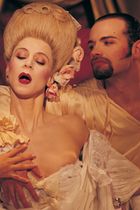
Mozart's DON GIOVANNI
Libretto by Lorenzo da Ponte
Dates:
11, 13, 17, 19, and 20 November (19:30) and
14 November 2004 at 15.00 Venue: The Elgin and Winter Garden Theatre
Centre, Toronto
Leporello Olivier Laquerre Don Giovanni Michael Chioldi Donna Anna Jackalyn Short Il Commendatore/Masetto Curtis Sullivan Don Ottavio Colin Ainsworth Donna Elvira Peggy Kriha Dye Zerlina Nathalie Paulin
Conductor Andrew Parrott Director Marshall Pynkoski Costume Designer Dora Rust-D'eye Set Designer William Schmuck Choreographer Jeannette Zingg
The Tafelmusik Orchestra
 Toronto's Opera Atelier, established
in 1985, has earned a reputation for innovative productions of opera,
ballet, and drama from the 17th and 18th centuries. Performing throughout
Canada, it has also toured the US, Europe, and Asia far from its bijoux
home at the Elgin Theatre. Its current revival of Don Giovanni
witnesses a company committed to novelty and stylish ensemble playing.
Toronto's Opera Atelier, established
in 1985, has earned a reputation for innovative productions of opera,
ballet, and drama from the 17th and 18th centuries. Performing throughout
Canada, it has also toured the US, Europe, and Asia far from its bijoux
home at the Elgin Theatre. Its current revival of Don Giovanni
witnesses a company committed to novelty and stylish ensemble playing.
This Don Giovanni wears its Konzept literally on its sleeves: Leporello is dressed as Harlequin and the Don, too, is in in commedia dell'arte costume. Throughout, the singers strike poses and derive gestures from that theatrical tradition. The link is never really convincing, though Director Marshall Pynkoski invokes Da Ponte's familiarity with the tradition. Happily, the approach is never truly bothersome, an idea tacked on to "sex" up a masterwork.
The only too way over-the-top moment comes at the end, when after the final chorus about the punishment of wrongdoers, a triumphant Don Giovanni returns from hell to toss his cap defiantly in the air. Just why he does so we don't know, and the music certainly says something else. The programme notes solemnly assure us, however, that by the end of the opera Don Giovanni "becomes truly heroic." Bumph. This is gimmickry rather than the ghost of an idea.
The cast -- fresh, youthful, and good-looking -- was committed, even if these were attractive rather than outstanding voices. Colin Ainsworth as Don Ottavio, had the prettiest on offer, but it is also small, failing at times to project in so congenial a setting as the Elgin Theatre. In the cavernous opera houses that are the North American norm, it would have been devoured.
Michael Chioldi's Don Giovanni (and one doesn't usually see former Yves Saint-Laurent models in the role) was dramatically and musically convincing. Anyone used to darker, more commanding voices in the role (that is to say, to those of older singers) might find him on the light side, but he conveyed the Don's obsessiveness with panache and was aptly partnered by Olivier Laquerre's Leporello, whose unfailing comic sense helped give dramatic thrust to the stage business. The youthfulness of both voices did not make for much contrast between the roles, but their collaboration was dynamic and wholly successfully.
Acting and dramatic sense were the strong point, too, of the two main women's roles, Donna Anna and Donna Elvira being adequately sung by Jackalyn Short and Peggy Kriha Dye. The most satisfying work of the evening by the "ladies" was, however, that of Nathalie Paulin whose Zerlina was psychologically more complex than usual in this role: at times innocent and at times confused, Zerlina knew in the end that she wanted to be in charge. Paulin displayed a lovely voice, with control and taste, her interaction with the handsome Masetto of Curtis Sullivan, showing off to advantage the acting skills of both. As the Commendatore, Sullivan was less successful, the voice not being dark enough to bring dignity and suggest age and otherworldly power.
Tafelmusik Orchestra, under British maestro Andrew Parrott, plays as it always does, which is to say with a fine sense of detail and a beauty of tone. If at rare moments one wanted a slightly larger orchestra and slightly bigger sound, this is a mere cavil. The violins shimmered, and the score got an energetic, at times even bold, reading.
© 2004 J. H. Stape